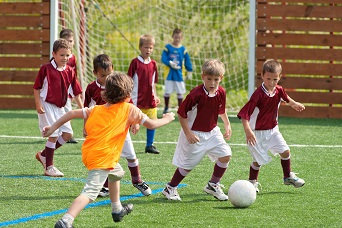Encouraging kids’ physical activity engagement and well being by improving their experiences in organised sport

Related topics
Health Innovation Health, Demographic Change and Wellbeing France Greece Spain United Kingdom Norwaydate: 24/02/2014
Project: Promoting Adolescent health through an i...
acronym: PAPA
See also: Info-Centre
Contact: http://www.projectpapa.org/
Research has found that one of the important determinants of whether a child continues playing sports or decides to quit is the motivational climate created by coaches, parents and teammates.
The European Union (EU)-funded research ‘PAPA’ project involved customising, delivering and evaluating a theory- and evidenced based training programme (i.e., Empowering Coaching™ for youth sport coaches across Europe. Within the PAPA project, researchers in the United Kingdom, Norway, Spain, France and Greece focused specifically on optimising the sport engagement of children aged 10 to 14 who were involved in grassroots football. The research team partnered with football associations in the 5 countries to train coach educators to deliver the Empowering Coaching™ workshop to grassroots coaches at community football clubs. In all, 1,159 grassroots football coaches were trained.
Data were collected from nearly 8,000 young players, some whose coaches had undertaken the workshop and some whose coaches had not taken part. Questionnaires assessed players’ perceptions of the coach-created climate on their team, motivation to participate, self-esteem, enjoyment of football, and intention to continue or dropout. The project team measured activity levels (via accelerometry) by tracking some players’ levels of physical activity and time spent sedentary while playing football and across a 7 day period. Finally, the researchers in 4 of the countries directly observed the behaviours of a sub-sample of coaches who received the Empowering Coaching™ training and those who did not during training sessions at the beginning of the season, one month after workshop delivery and at the end of the season.
Analyses of the data are underway now, but the early indications are promising. From the baseline data, researchers could tell that the motivational environment coaches create is relevant to players’ motivation and enjoyment of the game, well being and intention to continue. It also is predictive of players’ physical activity levels and time spent sedentary during training/matches and terms of an average day during the week.
“In an environment that is more empowering, the kids, regardless of their BMI, are moving more when they are playing, which from a health standpoint is really important,” says Project Director Joan Duda at the University of Birmingham in the United Kingdom.
Preliminary data analyses also shows that the coach training programme had measurable effects. “So far we have been able to show that across the five studied countries the trained coaches made children feel that they were playing in a more empowering environment, and these children also reported that they are more likely to continue playing,” explains Duda. Differences in the objective behaviours of the coaches during training sessions have also been noted, favouring the coaches who participated in the Empowering Coaching™ programme. Follow up focus groups with trained coaches indicated that they understood and were applying the key principles conveyed in the workshop.
The project team plans to build on the PAPA project and create a social enterprise with its hub at the University of Birmingham and partner institutions in other countries, so that the Empowering Coaching™ can be further disseminated and exploited.
One target for expansion is to target parents. Coaches involved in the PAPA trial reported that parents were the primary barrier to having the youth sport environment be more empowering and improving kids’ attitude towards sport. Moreover, the delivery of an ‘Empowering Parents’ training could open the door to discussing other healthy habits. “It is very difficult when you do interventions in the school to reach parents,” says Duda. “But one place parents do go is the club/pitches where youth sports take place. With that in mind we think there are some interesting ways we could reach parents, even about other health messages,” she concludes.
Video: The PAPA Project - End of Project Dissemination Conference
